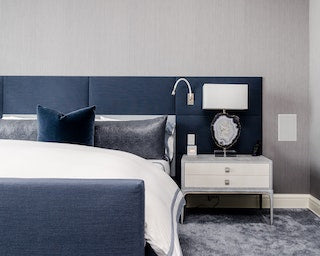
We're Staying Home To Prevent The Spread Of Novel Coronavirus, But Are We Unknowingly Spreading Other Germs In Our Home?
Share

We're all staying home to help slow the spread of novel coronavirus, COVID-19. We're working, having dance parties, #stayhomechallenges, and virtual everything. BUT...are we unknowingly spreading other germs in our home?
Let’s talk about in between your sheets. Don’t worry; I’m not talking about 50 Shades of Gray who’s in your bed kind of details. I’m talking about what’s in your bedding. Let’s face it, some of us are not changing our bed sheets often enough.
Not to point fingers or place blame, but guys, you need to clean up your act. A survey revealed that single men change their sheets four times a year. WHAT? That’s equivalent to once per season. Every three months. Every 90 days. You get the picture. And some guys wonder why they can’t get a partner to sleep over. The survey revealed that their dirty sheets stalled their romantic endeavors.
Guys in a relationship, you fared a little better. You change your sheets on average every two weeks. Before you relationship guys pat yourselves on the back, your female partners admitted to changing your bedding.
Don’t judge ladies, we have a little shame to our bedroom game, too. We might change our sheets weekly, but we’re not changing our pajamas often enough. That’s right -- women wear their nighties for an average of 17 nights before washing them compared to men who wear them for an average of 13 nights. (source)
Here’s a little tidbit for you -- pajamas worn for two weeks or more do not get hygienically clean when laundered due to buildup. Therefore, you’re transferring microbes to other clothing. Yikes!
Before you get upset, I know this information is not talking about you or me, but let’s look at the details anyway.
Fungi
Synthetic and feather pillows harbor fungal contamination, approximately four to sixteen species. (source) The most common fungus species is Aspergillus fumigatus, a common fungus carried in the air. Additionally, the infection, aspergillosis, is responsible for most deaths in leukemia and bone marrow transplant patients. (source) Fungal contamination also impacts people with respiratory conditions like asthma and sinusitis. And…in case you’re wondering which pillows are the biggest offenders: synthetic pillows. They have a greater fungal load. Yuck!
Bacteria
Humans are like snakes. No, I’m not talking about our behavior. Although; we all know a snake or two. I’m talking about our propensity to shed skin. As we sleep, our sheets are the unlucky recipients of our dead skin cells, which provide sustenance for dust mites. Dust mites cause itching, sneezing, watery eyes, and skin inflammation.
Our bedding also has the misfortune of catching our bodily excretions. Think fecal matter, sweat (26 gallons per year), saliva, genital, and urine milieu. (source) Think about every time you sneeze when you have a cold or have a contagious skin rash (we all carry staphylococcus, commonly called staph, on our skin). Your sheets can spread these infections.
Cosmetics
Let’s get real, ladies. When we go to bed with our makeup on, where do you think it goes? There’s only one obvious answer. It goes onto our bedding, particularly our pillow.
Don’t wear makeup? You’re still not off the hook. I’m sure you wear moisturizing creams, lotions, oils, and sunscreen. Think about it. You’ve been wearing those items all day catching whatever environmental debris attaches to your face.
When we go to bed without removing our makeup and cleansing our face of the day’s grime, we’re smearing that germ cocktail onto our pillow. This cocktail builds up as the week progresses. Therefore, we reintroduce them to our face every time we sleep on our pillow -- until we launder our sheets.
Food
This is for the snackers out there. I’m with you. I have a penchant for snacking, but let’s keep it out of the bed. You enjoy the comfort of sitting or lying in bed with a snack binge watching your favorite show on Netflix. But, you’re inviting microbes (microorganisms) into your bed.
Here’s another tidbit for you. Microbes can live from minutes to hundreds of years depending on the virus. (source) Not all viruses need a host carrier (human) to survive. To top it off, our skin cells that we slough-off while we’re sleeping provide these organisms a nice hearty meal. Yummy! Is that enough to convince you to keep the snacks out of your bed?
Allergens
Pet dander. Pollen. Dust mite debris. Dust mite feces. Manufacturing chemicals in our bedding. Laundry detergent chemicals. Dyes to get that perfect shade of bedding to match our décor. All of these allergens sink into the core of our mattress and pillows. They contribute to and exacerbate our allergies and asthma. Now you can stop wondering why you wake up congested in the morning.
Solutions
Now that I’ve completely grossed you out and probably have your skin crawling, let me share how you can halt the germ party in your bed. This is important because we spend one-third of our lives sleeping.
- Change your sheets weekly. More often if you’ve been sick.
- Use allergen-blocking covers on your pillows and mattresses.
- Cool off your bedding. Bed bugs like warm environments so pull your covers back to let your bed cool off before you make it up.
- Change and wash your pajamas every 1 to 3 days to prevent skin infections.
- Vacuum your carpets regularly.
- Don’t rely on the smell test. Just because your bedding and pajamas don’t smell doesn’t mean that they do not need washing.
In the words of Gandhi, “It does not require money to live neat, clean, and dignified.”
